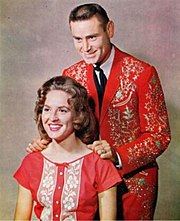Melba Montgomery
She was known for a series of duet recordings made with George Jones, Gene Pitney and Charlie Louvin.
Along with her two brothers (songwriters Carl and Earl Montgomery), she placed in a talent contest which brought her to the attention of Roy Acuff.
Melba Joyce Montgomery[1] was born into a musical family in Iron City, Tennessee, United States, on October 14, 1938.
[2] She was raised in Florence, Alabama where her father taught vocal lessons in the local Methodist church.
When she was age 20, the sibling trio won an amateur talent contest held at Nashville radio station WSM's Studio C, which at that time housed the Grand Ole Opry.
[2] Impressed by her singing, talent content judge, Roy Acuff, invited Montgomery to tour with him in replace of singer, June Webb.
Her music was discovered by George Jones (who was also on United Artists) who persuaded producer Pappy Daily to sign her to the label.
[9] Other singles by the pairing made the Billboard country top 40 through 1967: "Please Be My New Love", "Multiply the Heartaches" and "Party Pickin'".
In reviewing a 1996 compilation, Stephen Thomas Erlewine of AllMusic found their songs to "illustrate how well-suited the pair was for each other" and that Montgomery was perhaps "Jones' best duet partner.
[3] Her 1963 solo singles, "Hall of Shame" and "The Greatest One of All", both made the top 30 on the Billboard country songs chart.
Her debut studio album was released in 1964 by United Artists called America's Number One Country and Western Girl Singer.
Only 1967's "What Can I Tell the Folks Back Home" made the Billboard country chart, peaking at number 61.
[9] Five more of their duet singles made the country chart through 1972, including the top 40 entries "Did You Ever" and "Baby You've Got What It Takes".
[1] In 1973, producer Pete Drake helped her sign with the newly formed country division of Elektra Records.
[20] A second single spawned from the album in early 1974 failed to reach the top 40 in the United States and Canada.
[7][19] In 1974, songwriter Harlan Howard brought Montgomery a song he had reportedly written especially for her called "No Charge".
[21] The song was written from the point of view of a mother who tells her child how she has cared for him without ever being paid for her domestic responsibilities.
The follow-up singles, "Your Pretty Roses Came Too Late" and "If You Want the Rainbow", both failed to reach the country top 40 in 1974.
Elektra would issue a final studio album under their label in November 1975 titled The Greatest Gift of All, which failed to chart.
[9][26] Montgomery returned to United Artists Records in 1976 and began working under the production of Larry Butler.
The highest-charting was a cover of Merrilee Rush's "Angel of the Morning", which made it to number 22 on the Billboard country chart.
[7] In April 1978, United Artists issued Montgomery's second eponymous LP featuring "Angel of the Morning".
[3] In 1980, she returned on the Kari label with "The Star", a single which made a brief appearance on the Billboard country chart.
[32] AllMusic's Greg Adams gave the album a two-star rating and commented, "She sounds great and the material is fine, but Do You Know Where Your Man Is isn't up to the standards of the music she made in her prime.
"[33] Beginning in the nineties, Montgomery started working more heavily in the field of country music songwriting.
[39] She also co-wrote the single, "Out of Control Raging Fire", which was recorded in 2001 by Patty Loveless and Travis Tritt.
Other songwriters credited on the disc included Kostas, Jerry Salley and her husband, Jack Solomon.
[48] In her final years, Montgomery had dementia and died at a Nashville care facility on January 15, 2025, at the age of 86.

